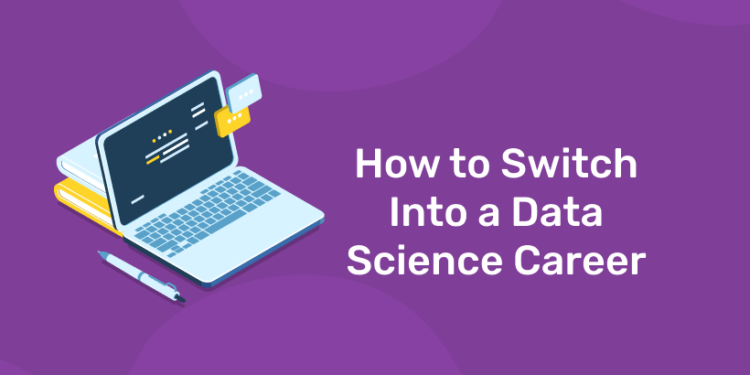Table of Contents
Key Takeaways:
- Data science is a booming field with a 28% predicted job growth by 2030 and salaries ranging from ₹6-20+ LPA depending on experience.
- Anyone can transition to data science by acquiring key technical skills, building a portfolio, and networking strategically.
- Follow a structured roadmap: self-assessment, learning, projects, industry engagement, and job hunting.
- Understand role differences like Data Analyst, Data Scientist, ML Engineer to target your learning and career goals.
- Entri’s AI-powered Data Science course offers industry-relevant skills, real projects, AI integration, and placement assistance.
Introduction: Why Switch to Data Science Now?
Imagine turning your curiosity about patterns in data into a full-fledged career where your insights impact business strategies, healthcare breakthroughs, or global technologies. Data science offers exactly that – a modern, in-demand profession that combines coding, critical thinking, and domain expertise. With digital transformation accelerating worldwide, the need for data experts who can navigate complex data and generate actionable outcomes is greater than ever.
Transitioning your career into data science in 2025 is more accessible than you might think. You don’t need a traditional tech background. Whether you’re from finance, marketing, engineering, or completely new to tech, acquiring the right skills and mindset can put you on the fast track to an exciting, high-paying role. This guide lays out the essential steps, skills, and strategies to help you successfully switch careers and thrive in data science.
Why Choose a Career in Data Science?
1: Which of the following algorithms is most suitable for classification tasks?
- Fast Career Growth: The U.S. Bureau of Labor Statistics predicts a 28% job growth for data scientists by 2030, highlighting a booming market worldwide.
- Attractive Salaries: Entry-level roles in India average ₹6-12 LPA, while experienced professionals can earn ₹20 LPA or more, with international opportunities offering even higher pay.
- Varied Roles: From Data Analyst to Machine Learning Engineer and AI Specialist, data science offers diverse paths to fit various interests.
- Cross-Industry Demand: Finance, healthcare, e-commerce, manufacturing — every industry needs data expertise.
- Innovation-Driven: Work on cutting-edge technologies including AI, big data, and automation to solve real-world problems.
Get the latest update on coding courses in Entri App
🚀 Start Coding Today! Enroll Now with Easy EMI Options. 💳✨
Equip yourself with in-demand skills to land top-tier roles in the data-driven world.
Start Learning Now with EMI OptionsA Stepwise Roadmap to Switch Careers into Data Science
Switching into data science requires a structured and strategic approach. The journey involves acquiring foundational knowledge, building skills, gaining practical experience, and engaging with the industry. Here’s a detailed step-by-step roadmap customized for 2025 to make your career transition effective and goal-oriented:
1. Self-Assessment and Goal Setting
Before diving into learning, reflect on your current skills and career aspirations:
- Evaluate Your Existing Skills: Identify your strengths in mathematics, statistics, programming, and domain expertise. Also, evaluate soft skills such as problem-solving and communication.
- Choose Your Target Role: Data science covers roles like Data Analyst, Data Scientist, Machine Learning Engineer, Data Engineer, and Business Intelligence Developer. Pick the one that aligns with your interests and background.
- Set Clear Timelines:
- Beginners with no prior programming/data experience: 9-12 months learning plan.
- Professionals with some coding or analytical experience: 3-6 months fast-track.
- Define Your Learning Style & Budget: Decide if you prefer self-paced learning, online courses, bootcamps, or formal degrees. Each has pros and cons depending on your situation.
Tip: Use online skills assessments or quizzes to objectively measure where you stand and what to prioritize.
2. Acquire Essential Data Science and Analytical Skills
Your success hinges on building strong technical foundations across several domains:
- Programming Languages:
- Python: The most popular language in data science. Focus on libraries such as pandas (data manipulation), NumPy (numerical computing), Matplotlib & Seaborn (visualization), scikit-learn (machine learning), and basics of TensorFlow/PyTorch (deep learning).
- SQL: Learn to extract and manipulate data from databases using SELECT, JOINs, GROUP BY, and window functions.
- R (optional): Useful for statistical analysis and academic research but less prominent in industry.
- Mathematics & Statistics:
- Master Descriptive/Inferential Statistics: mean, median, variance, hypothesis testing, confidence intervals.
- Understand Probability Theory: distributions, Bayesian thinking, random variables.
- Basics of Linear Algebra: vectors, matrices — crucial for understanding complex ML algorithms.
- Calculus: Basics for optimization in machine learning models.
- Data Manipulation and Visualization:
- Cleanse and transform raw data into analyzable formats.
- Create meaningful visualizations to communicate insights using Tableau, Power BI, or Python libraries.
- Machine Learning Fundamentals:
- Understand supervised vs unsupervised learning.
- Study algorithms like linear/logistic regression, decision trees, clustering.
- Develop hands-on experience building models using scikit-learn.
- Big Data and Cloud Basics:
- Exposure to big data tools like Hadoop and Spark is helpful for roles involving large-scale data.
- Familiarity with cloud platforms (AWS, Google Cloud, Azure) for deployment and scaling.
- Soft Skills:
- Communication and storytelling for translating technical insights to business decisions.
- Critical thinking and problem-solving mindset.
- Team collaboration and project management basics.
Tip: Establish a daily learning routine balancing theory and practice. Platforms like Coursera, edX, or specialized courses can help structure learning.
3. Build a Strong Portfolio of Projects
Employers value demonstrable skills over just certification. Create a compelling portfolio by:
- Applying Concepts on Real Datasets: Use open datasets from Kaggle, UCI ML Repository, or industry-specific data.
- Cover End-to-End Workflows:
- Data collection and cleaning.
- Exploratory Data Analysis (EDA) with visualizations.
- Feature engineering and model building.
- Model evaluation metrics and interpretation.
- Host Your Work Publicly:
- Publish on GitHub with clear README files explaining your approach.
- Participate in Competitions:
- Join Kaggle or DrivenData challenges to apply skills in real-world scenarios and gain peer feedback.
Tip: Pick projects related to your previous domain expertise (finance, healthcare, marketing) to leverage transferable skills and stand out.
4. Networking and Industry Engagement
Building relationships can open doors to job opportunities, mentorship, and collaboration:
- Join Professional Communities:
- LinkedIn groups focused on data science and AI.
- Local meetups (both virtual and in-person).
- Platforms like DataCamp Community or Reddit’s r/datascience.
- Attend Conferences and Webinars: Events like Strata Data Conference or local AI summits enrich knowledge and connections.
- Find a Mentor:
- A mentor can provide career guidance, help with technical doubts, and offer referrals.
- Leverage Social Media:
- Share your projects and insights on LinkedIn or Twitter to build a professional presence.
Tip: Actively engage by asking questions, sharing knowledge, and contributing to discussions to build a strong network.
5. Apply for Entry-Level Data Science Roles
Ready with skills and portfolio? Time to start the job search:
- Customize Your Resume and LinkedIn Profile:
- Highlight relevant programming skills, projects, and domain knowledge.
- Use keywords matching job descriptions to pass applicant tracking systems (ATS).
- Prepare for Interviews:
- Practice coding challenges on platforms like LeetCode or HackerRank focused on Python and SQL.
- Anticipate behavioral interview questions and case studies on data-driven problem-solving.
- Seek Entry Roles or Internships:
- Roles such as Data Analyst, Junior Data Scientist, or Data Engineer offer excellent starting points.
- Internships or contract roles provide valuable experience and can lead to permanent positions.
- Use Job Portals and Company Careers Pages:
- Indeed, LinkedIn, Glassdoor, and niche tech job boards.
- Leverage connections from networking for referrals.
Tip: Keep learning alongside your job search, especially on interview topics and new tools.
People also read: Top 100 Data Science Interview Questions and Answers
Important Roles in Data Science: Know Your Target
| Role | Key Skills | Focus Area |
|---|---|---|
| Data Analyst | SQL, Excel, Visualization tools | Data cleaning, reporting, trend analysis |
| Data Scientist | Python, Machine Learning, Statistics | Predictive modeling, experimentation |
| Machine Learning Engineer | Python, ML frameworks, Software Engg. | Model deployment, algorithm optimization |
| Data Engineer | SQL, ETL tools, Big Data platforms | Data pipeline design and infrastructure |
| Business Intelligence | Dashboarding, SQL, Analytical skills | Business reporting and insights |
- Leverage Your Domain Knowledge: Use your prior professional experience to give context to data analysis and modeling.
- Stay Updated with Trends: Follow major industry news via sources like KDnuggets, Towards Data Science, or DataCamp blogs.
- Practice Coding Regularly: Make daily exercises or mini-projects a habit to build confidence and fluency.
- Seek Feedback: Share your work with peers, mentors, or online forums for constructive criticism.
- Be Patient and Persistent: Building data science expertise takes time; steady progress pays off.
Entri’s AI-Powered Data Science Course
If you’re serious about making a confident career switch into data science, Entri’s AI-powered Data Science Course is tailored for you. This course combines the latest industry practices with AI-driven learning tools to provide an immersive experience:
- Comprehensive Curriculum: Learn Python, SQL, machine learning, data visualization, and big data tools.
- Real-World Projects: Hands-on assignments that prepare you to build a job-ready portfolio.
- AI Integration: Leverage AI-powered study aids and automated feedback to enhance your learning efficiency.
- Placement Assistance: Access to Entri’s network of hiring partners with dedicated career support to land data science roles.
- Flexible Learning: Self-paced with mentor support to clarify doubts instantly, balancing your work and study.
Start your data science journey with Entri to gain skills, confidence, and job readiness to excel in this fast-growing field.
🚀 Start Coding Today! Enroll Now with Easy EMI Options. 💳✨
Equip yourself with in-demand skills to land top-tier roles in the data-driven world.
Start Learning Now with EMI OptionsConclusion: Take the Leap and Transform Your Career
Data science is not just a profession; it’s a gateway to transforming industries and making impactful decisions through data. Regardless of your current background, the journey to becoming a data professional in 2025 is within your reach with focused learning and the right guidance.
Entri’s AI-powered Data Science Course offers the structured learning, hands-on practice, and real-world connectivity to ease your career switch and boost your job prospects. Don’t let hesitation hold you back—embrace the challenge and enroll today to make your data science career a reality.
🚀 Start Coding Today! Enroll Now with Easy EMI Options. 💳✨
Equip yourself with in-demand skills to land top-tier roles in the data-driven world.
Start Learning Now with EMI OptionsFrequently Asked Questions
Can I become a data scientist without a technical degree?
Absolutely. Many data scientists come from non-technical fields. Focus on gaining technical skills through structured learning and projects.
How long does it take to switch to data science?
Typically 6-12 months for beginners; shorter for those with prior coding or analytical skills.
Do I need to know machine learning before entering data science?
Basic understanding is important but can be developed progressively. Start with fundamentals like statistics and Python.
Which programming languages are essential?
Python and SQL are foundational. R is optional but useful for statistics-heavy roles.
Should I pursue certification or self-study?
Certifications offer structured learning, projects, and placement assistance. Self-study is flexible but requires discipline.














